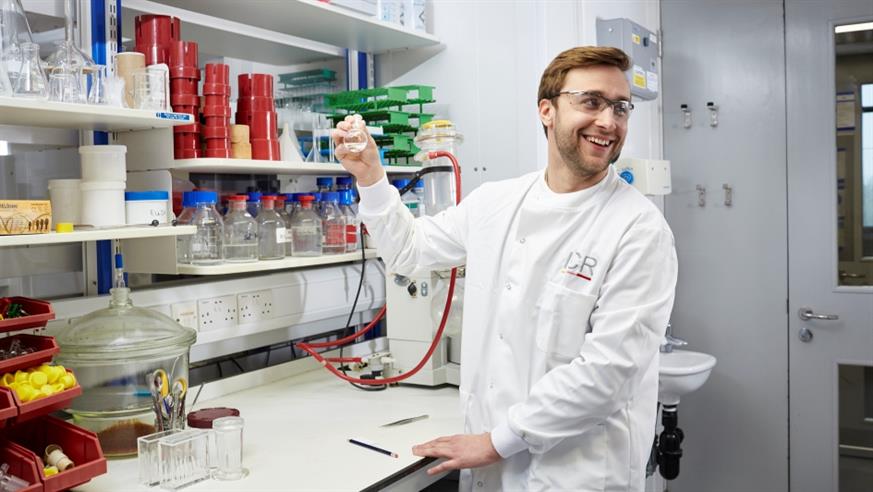
Over one-third of surviving cancer patients have received state-of-the-art targeted drug treatment or immunotherapy, reveals a new survey highlighting the ‘revolution’ in cancer treatment over the last decade.
Use of genetically targeted cancer drugs or immunotherapies is catching up fast with traditional mainstays such as chemotherapy – and in some cancer types modern therapies are now the standard way of treating the disease.
The Institute of Cancer Research, London, conducted the survey of more than 1,000 cancer patients to provide a ‘state of the nation’ overview of cancer treatment, ahead of completion of its new £75 million Centre for Cancer Drug Discovery.
The Centre will house the world’s first drug discovery programme dedicated to addressing the challenge of cancer evolution and drug resistance – and The Institute of Cancer Research (ICR) believes it will drive the next revolutionary change in the landscape of cancer treatment. The Centre will bring together, under one roof, world-leading researchers from very different disciplines across drug discovery and evolutionary science to create new resistance-busting treatments.
The changing face of treatments
The responses from 1,064 patients who took part in the survey detail the extent to which advances in research have already transformed treatment for many people.
Overall, one in three patients (32 per cent) questioned received either a targeted drug therapy, immunotherapy or both. One in four patients (24 per cent) had targeted drug therapy and one in 10 patients (11 per cent) received immunotherapy.
But in some cancer types, the rise of state-of-the-art, precision treatments has been even more dramatic.
Among patients who had been treated for melanoma – an aggressive form of skin cancer in which there has been huge progress with targeted therapies and immune checkpoint inhibitors – two in three patients (66 per cent) said they had received immunotherapy compared with just 5 per cent who received chemotherapy.
And among patients treated for leukaemia, in which there were the first successes for precision medicine, 53 per cent had received targeted drugs, compared with just 43 per cent on chemotherapy.
More progress is needed
The ICR has warned, however, that much more progress is still needed – as it pushes for a further £15 million in donations so it can finish the Centre for Cancer Drug Discovery. A recent ICR report found that tumour types of high unmet need such as pancreatic, liver, oesophageal and brain cancer have seen very few, if any, new drugs coming through over the last couple of decades.
It is likely that patients who were unable to respond to the survey because of their cancers’ very poor survival rates will have been less likely to receive modern treatments.
When asked to give their top three priorities for treatment, 72 per cent of patients said ‘to have a longer life expectancy’, but this was closely followed by 64 per cent who said improved quality of life while 37 per cent said fewer side effects from treatment was important.
The survey also demonstrates the importance of the internet in helping patients find information about new treatments. While the largest proportion of patients (40%) found out about new treatments from their consultant, 30% found out about new treatments from internet searches, and 17% said they had heard about new treatments in news reports.
Between 4 March and 15 April 2019, the ICR surveyed 1,064 cancer patients by working closely with patient support groups, who distributed it to their members, and by promoting it on social media. The findings do not provide a definitive picture of access to treatment, but they do give a valuable insight into the experiences and views of cancer patients. We are enormously grateful to everyone who responded.
‘A new generation of cancer medicines’
Professor Paul Workman, Chief Executive of The Institute of Cancer Research, London, said:
“Our survey of more than a thousand people who have been treated for cancer provides a state of the nation for cancer treatment, and reveals just how much research has already transformed the landscape for patients.
“At the ICR, we are changing the entire way we think about cancer, to focus on understanding, anticipating and overcoming cancer evolution, so we can help bring through the next step-change advances in treatment.
“If we can raise a further £15m to deliver our new Centre for Cancer Drug Discovery, we can bring together – under one roof – experts in cancer therapeutics and computational big data alongside others studying evolution in animals, cells and individual patients, to create a new generation of cancer medicines.”
We are building a new state-of-the-art drug discovery centre to create more and better drugs for cancer patients.
Professor Rajesh Chopra, who will be Director of Cancer Therapeutics in the Centre for Cancer Drug Discovery, said:
“Going back 20 years, the vast majority of cancer patients who had treatment for their disease were on traditional, one-size-fits-all chemotherapy – with targeted drugs practically unknown, and immunotherapy the stuff of science fiction. So it’s terrific to see from this survey how much progress has already been made, as we set our sights on even greater progress in the years to come.
“The ICR has made a major contribution to the uptake of modern precision medicines – discovering more targeted drugs than any other academic centre in the world, and playing a role in the discovery or development of almost a fifth of all cancer drugs licensed in Europe between 2000 and 2016.
“We firmly believe that, with further research, we can find ways to make cancer a manageable disease in the long term and one that is more often curable, so patients can live longer and with a better quality of life. But that research will need support and our new Centre for Cancer Drug Discovery will dramatically accelerate the progress we’re already making.”